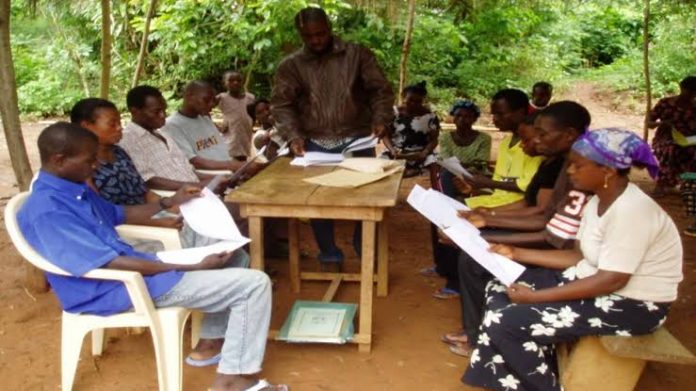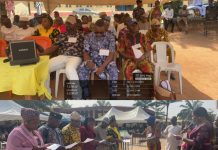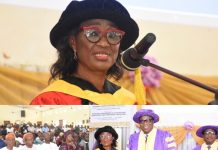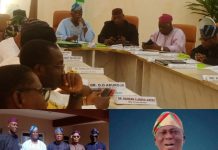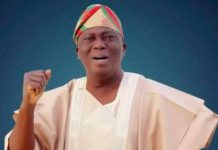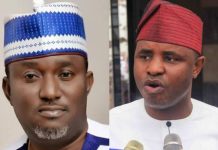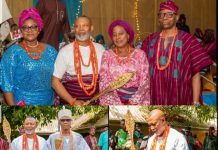
Available documents and literature with interview of legends reveal that the Nigerian National Council for Adult Education (NNCAE) was birthed as non-governmental organisation on the 27th of March in the year 1971 at about 12.05 pm with Professor E. A. Tugbiyele as the National President and Professor (then Dr) J. T. Okedara as the National Secretary. The premiered Council, since its creation, has been driving and providing direction for the development of adult education. Especially, it serves as platform for teachers in the field and practitioners on the field (1974 NNCAE Newsletter) to share knowledge, advice, best practices, and lessons learned with one another which incontestably have led to the growth of members and the Council in the last 50 years. The impact of the activities of the Council transcends the development of her members to national and global adult educational development as well as development of the community, national and world’s educational systems.
In testimony, the Council has been relentlessly pursuing the achievement of a hundred percent literacy in the Country by deploying its expertise and advising government on the planning and execution of the three decadally literacy campaigns ever launched: 1971-1980, 1982-1991 and 1992-? (?, no official or government position). As the national literacy rate of people of age 15 and above who can both read and write with understanding a short simple statement about their life in Nigeria still stands below 70% and the number of out of school children is abysmally and unacceptably high, in the neighbourhood of 13.2 million barring the effect of insecurities in the country, the Council is continuing with its aggressive advocacy and consultation with governmental and non-governmental agencies on how to remarkably ensure improvement. More importantly, the Council strongly believes that this is a good course or ‘fight’ realising the fact that adult and childhood basic education is fundamentally important in economic and political development of the people well as in improving people’s lives.
Perhaps if Nigeria with the cooperation of all has invested early, smartly and inclusively in learning of both adults and children, the country would have been more peaceful and secure with conducive environment for its all round development. Also, it would have been better positioned in the global economy and have weighty recognisable say in global polity.
Suffice to reiterate that the vision and sphere of influence of the Council is unlimited to itself and its members but extended beyond to promoting all pertaining to educational system of the Country and by extension the globe. For instance, the NNCAE as a foremost educational and nongovernmental organisation and a trail blazer in educational matters, through its Oyo State Branch held the first national workshop on the inaugural National Policy on Education at the Conference Centre of the University of Ibadan from Monday May 23 to Thursday May 26, 1977 to critically assess and discuss the relevance of the white paper on the National policy as well as highlight the innovation and the weaknesses contained therein with the aim of improving the quality of the document through suggestions and recommendations.
Undoubtedly, the Workshop was successful and impactful judging by the calibre of participants, quality of presentations and ensued discussions with recommendations being reflected in the final document. Needless to add, the Council through its members contributed to the drafting of the section of the National Policy on Adult and Non-Formal Education. In all and indeed, the Workshop was a national workshop on an issue of national interest by a pioneer national professional body with national interest. This statement was attested to by the Rapporteur-General of the Workshop and the Secretary of the Oyo State Branch of NNCAE, Professor Michael Omolewa (Then Dr.) who remarked that before the workshop, ‘no professional body had attempted’ it.
Besides, record has it that the NNCAE was instrumental to inclusion of adult education in the 1975-1980 First National Development Plan. Among others, the Plan contains a proposal for the establishment of a National Adult Education Centre which was not countenanced till 1990 with the establishment of National Commission for Mass Literacy, Adult and Non-Formal Education via Decree 17 of 25 June, 1990. That is, the Council was instrumental to the creation of the Commission with its pressure group disposition. Similarly, suggestions by the Council influenced establishment of Adult and Non-formal Education Unit in the Federal Ministry of Education in 1975 which subsists till date with parallel unit being founded at the State and Local Government Levels. It is unquestionable the Council has been “out-going or proactive” in advancing the course of adult education and situating programme in reality with adoption of advocacy and occasionally acting as pressure group. The same spirit and desire to promote adult education in the country continue till date as highlighted in its 2020 Constitution:
To advance knowledge of Adult Education to all relevant stakeholders, including parliamentarians, public authorities, academia, civil society organizations, and the private sector on its roles and contributions to the development of societies, i.e. social cohesion, health and well-being, environmental protection, inclusive, equitable and sustainable development
Furthermore, the Council as body or its members have collaborated with sister organisations to produce resource materials for use in adult education programme. Such materials include instructional materials like primers and curricular produced by the National Mass Literacy Centre in Kano or Federal Ministry of Education through NMEC with the support of international organisations such U. N. D. P., UNICEF, and UNESCO. As a confirmation, the immediate past Executive Secretary of the NMEC, Professor Abba Abubakar Haladu in his acknowledgement of the contributions of the Council with other organisations to the development of “2017 Mass Literacy, Adult and Non-Formal Education Policy Guidelines for Nigeria” wrote thus:
The Commission deeply appreciates the active participation of the Nigerian National Council for Adult Education (NNCAE),… in the development of the Policy Guidelines.
The NNCAE’s contribution was symbolic as it contributed significantly in terms physical and numerical presence and intellectualistic input on the basis of expertise from November, 2012, October and November, 2015 to May 2017 More recently, the Council has been commissioned by the NMEC to lead in the production of a directory of adult education facilities and resources in Nigerian adult educational institutions. The project is on-going and the benefit will be symbiotic. Certainly, the directory will provide avenue to market adult education resources-human and non-human- available in Nigeria, quality and quantity wise; a similitude to resource-mapping. In addition, it will foster collaboration, cooperation and networking among enlisted individuals and institutions leading to enrichment of policy and programme.
The hallmark of the NNCAE as an evolving professional body is the annual publication of its journal-Adult Education in Nigeria with organisation of annual conference in line with its goals of “stimulating training programmes and the development of needed literature” and publishing an Adult Education journal to disseminate information and research throughout Nigeria and the world; and “Fostering the regular exchange of information, publications, documentation and materials on policies, concepts and practices and relevant research on Adult Education among professionals at national, regional and international levels through the maximal use of information and communication technologies”. These two events bond members together giving habitual identity besides the benefit of professional and academic career development. Publishing in the Journal and attendance of conference connect members to one another, link participants/authors to other professional in and outside Nigeria and keep them abreast of development in the field of adult education. The publication of the Journal with organisation of the Annual Conference has been consistent. Themes for both are usually topical throwing up problem(s) of national and international importance in attempt to proffer plausible solutions through suggestions and recommendations. It is important to note that from 2016 the Journal has been rebranded and updated to international standard waiting for acceptance into comity of high impact journals. Creation of website and appearance online are desired. More, a deliverable of every Conference is to issue a widely publicised “communiqué” which always influence public policy regarding adult education. When the going was good for the Council, Press Conference was habitually organised. The good days, with the kind support of national and international organisations, also witnessed publication of a Newsletter, the value of which was very great and a pride to the Council and every member.
During the Council’s early years till 1989, conference attendees were in hundreds with decline being experienced after, due to crisis related to leadership transition in that year which resulted to exodus of many practitioners or field workers and formation of dissident association. For strong membership drive of subsequent Executives and reconciliatory move by senior citizens of the Council with unrepentant members who believe in its course, it is bouncing back and waxing strong. At this juncture, through this medium, the various Executive Committee members who hold forth and sustain the Council till now and members of goodwill and resilience who stood by during the very challenging period deserve unreserved commendation and so they are strongly and openly commended. More so, it is worthy to note that the management of the Council up-to-date runs on volunteering. Similarly, volunteers are responsible for the planning and execution of the Annual Conferences. In the instance, to determine the location of each conference, members would present their institutions for a vote by the general membership at that Conference. On determining the location, a local organising committee is constituted which jointly with the Council’s executives source for funds to plan for and execute the conference. Notably, execution of projects and programmes by NNCAE over the years, particularly in the preparation for this 50th Anniversary, leverages robustly on ‘committee system’ making achievement of goals to be collective and easy, possibly riding on the principle of participatory approach, very popular in adult education practice.
However, there is a dilemma! The Council is legally recognised as a non-governmental organisation with just a dint of professional colouration. The intention of transforming it to a full-fledged professional body demands parliamentary legal instrument, a process that is tortuous and demanding. For its value, it is worthwhile a course to pursue. Presently, the Council can only bark but not bite; it has no control over the practice and programming of adult education. Contributions have been advisory and non statutory. So, it has no say over a number of untrained workers masquerading themselves as adult education practitioners in the Ministries, Departments and Agencies (MDAs) at state and federal government levels. Some are heads of the units while few are trainers in adult education institutions. The act and conduct of such workers certainly would be detrimental to the development of adult education and invariably to educational system and national development. In the interim, it behoves the Council to call for training of this category of workers in any of the extant training institutions. The current executive president is commended in deploying emerging social media in the conduct of meetings and dissemination of information but it time for the Council to create a website to enhance real time interaction among members, drive organisational values, and encourage user sign up and to place the Council on the global map.
So, the celebration of the 50th Anniversary avails opportunity to look back and assess our journey thus far; to estimate what has been achieved of the goals set and what ground needs to be covered considering the prevailing situations, mission and vision collectively designed. The pass mark is that it remains active and stable over the years. But, a glaring course is to ensure that members feel the Council better and enjoy the dividend of belonging to the Council to a greater extent. Working towards professionalism is another desire that should not be compromised. As said, in the past the Council had a network of friends and partners in ALAAE, ICAE, UNESCO, UNDP etc. The questions are: what strain the relationship? Can the friendship and partnership be restored and how? In addition, how can we bring back those who left off and step up membership drive? The celebration is also moment to honour the founding fathers. A time to celebrate living legend, singling out Professor Micheal Abiola Omolewa a world re-known encyclopaedia of our time and immortalise those who served and have departed. Many people have been critical on this journey: past and present executive members, sponsors of the Council’s programmes, men of the press and the like. Since the central position of professional societies is to bring excellent leverage with which to design and promote change, including through publications, policy statements, meetings, committees, lectureships, and awards, the NNCAE has done well in the last 50 years and so we salute ourselves and thank all our supporters within and outside Nigeria.
Prof. Kola Kassim is the current president of NNCAE.
PS: The views, thoughts, and opinions expressed in the text belong solely to the author, and not necessarily that of the Publishers of The Precision NG.


